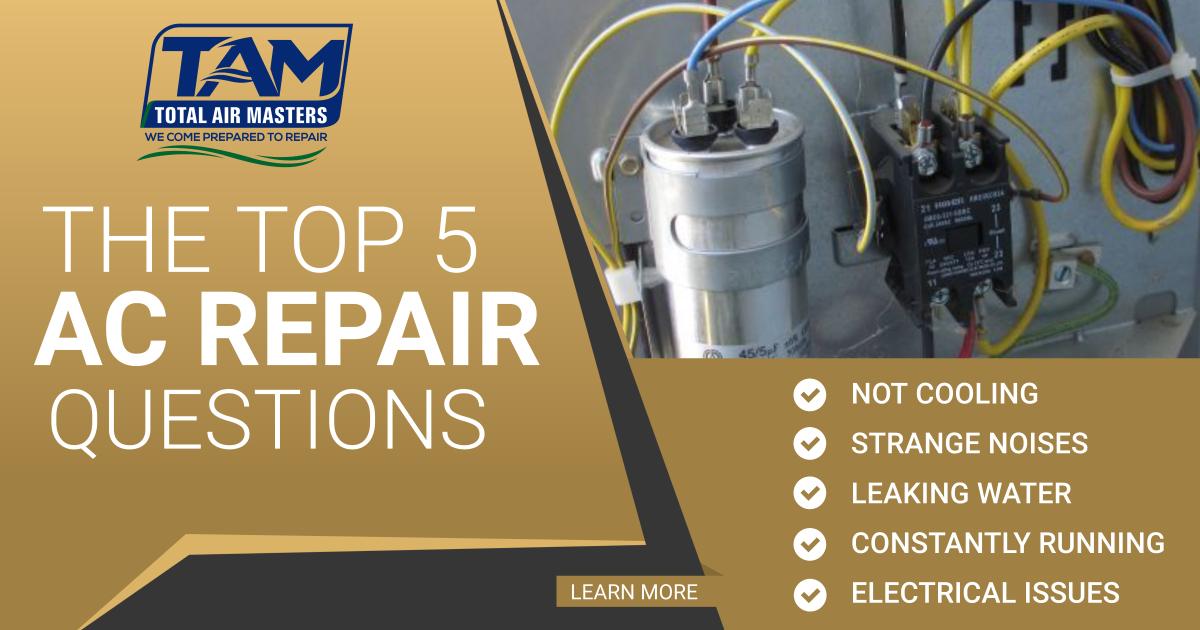
Home air conditioning systems play a vital role in maintaining a comfortable indoor environment, especially during the hot summer months. However, like any complex machinery, AC units can encounter problems and require repair. Understanding common AC issues and their solutions can help homeowners troubleshoot and address these problems effectively.
Lets explore the top five home AC repair questions and provide detailed answers to help you diagnose and resolve common air conditioning issues. From cooling problems and strange noises to water leaks and electrical issues, we will equip you with the knowledge to tackle these challenges and ensure your home stays cool and comfortable.
Why is my air conditioner not cooling effectively?
There could be several reasons why your air conditioner is not cooling effectively. Some common causes include:
- Dirty air filters: Clogged or dirty filters restrict airflow, reducing cooling efficiency. Clean or replace filters regularly.
- Refrigerant leak: A refrigerant leak can cause a drop in cooling capacity. Consult a professional technician to locate and fix the leak.
- Condenser issues: Dirty condenser coils or a malfunctioning condenser fan can impede heat transfer. Clean the coils and ensure the fan is working correctly.
- Thermostat problems: An inaccurate or faulty thermostat may not signal the AC to cool properly. Verify the thermostat settings and replace if necessary.
Why is my air conditioner making strange noises?
Unusual noises from your AC unit can indicate underlying issues. Here are some common noises and their potential causes:
- Rattling or buzzing: Loose parts, such as screws or fan blades, can cause these sounds. Tighten any loose components or seek professional assistance.
- Hissing or gurgling: These sounds often indicate refrigerant leaks. Schedule a service call with a qualified technician to address the issue.
- Squealing or screeching: A worn-out belt or motor bearing may be the culprit. Have a technician inspect and replace any faulty parts.
- Banging or clanking: Loose or broken internal components, like the compressor or blower motor, can cause these noises. Turn off the unit and contact a professional for repairs.
What should I do if my air conditioner is leaking water?
Water leakage from an air conditioner can stem from various sources. Follow these steps to address the issue:
- Turn off the AC: Switch off the air conditioner to prevent further damage.
- Check the condensate drain line: A clogged drain line can cause water to back up and overflow. Clear any blockages using a wet/dry vacuum or consult a professional.
- Inspect the condensate pan: A cracked or damaged condensate pan can cause leaks. Replace the pan if necessary.
- Evaluate the evaporator coils: Dirty or frozen coils can lead to excess condensation. Clean the coils or consult a technician for assistance.
Why is my air conditioner constantly running?
If your air conditioner runs continuously, it may indicate an underlying issue. Consider the following possibilities:
- Thermostat settings: Ensure the thermostat is set to the desired temperature and the fan is on “Auto” mode.
- Airflow restrictions: Check for blocked or closed vents and make sure the air filters are clean.
- Low refrigerant levels: Insufficient refrigerant can cause the AC to run longer in an attempt to cool adequately. Schedule a professional inspection and recharge if necessary.
- Oversized unit: If your AC is too large for your space, it may cool the room too quickly, leading to frequent cycling. Consult an HVAC specialist to evaluate your system’s sizing.
What are the common causes of AC electrical issues?
Electrical problems can disrupt the functioning of your air conditioner. Consider the following culprits:
- Tripped circuit breaker: A tripped breaker can indicate an electrical overload or short circuit. Reset the breaker, but if it trips again, consult an electrician.
- Faulty capacitor: The capacitor provides an electrical boost to start the AC compressor. A faulty capacitor can prevent the unit from turning on. Replace it if needed.
- Defective contactor: The contactor controls the power supply to the compressor. If it malfunctions, the AC won’t start. Have a professional inspect and replace the contactor if necessary.
- Wiring issues: Damaged or loose wiring can cause electrical problems. A qualified technician should assess and repair any wiring problems to ensure safety and proper functioning.
Remember, while these answers provide general guidance, it’s always best to schedule an appointment and let us accurately diagnose and repair your specific AC issues.
